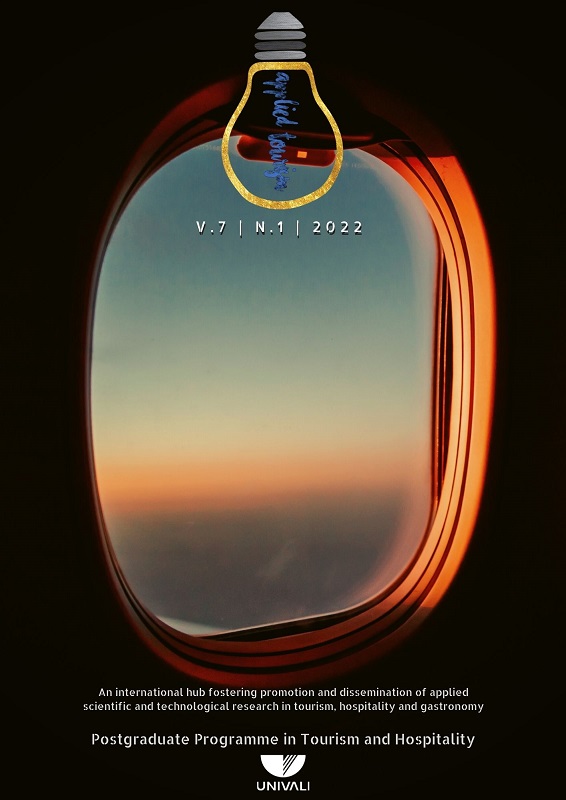Potentialities of the relationship between tourism and education: Report of experience of the tourism awareness project in the city of São Bernardo, Maranhão
DOI:
https://doi.org/10.14210/at.v7n1.p28-33Palavras-chave:
Tourism, Local Development, Tourism Education, School community, São Bernardo (MA)Resumo
The text presents a report of experience of a socio-educational action entitled Tourism Incentive Project (PROINTUR) developed by a group of students in the 6th period of the Bachelor in Tourism Course of the Federal University of Maranhão (UFMA), São Bernardo campus. The action was developed at the Deborah Correia Lima Teaching Center, and its main goal was to raise awareness among the school community regarding the importance of tourism as a socio-historical, spatial and cultural phenomenon, a factor for promoting economic growth, and an agent for social inclusion. The importance of tourism for community development is discussed, as well as tourism education actions, especially in the school context. This is followed by a presentation of the results achieved by the project. The work was based on bibliographic research, addressing the relationship between tourism and tourism education (Rabelo, 1998; Ribas, 2008; Fonseca Filho, 2007) and by pedagogical activities such as lectures, group dynamics and conversation circles with tourism and its production chain, tourist potential, and local development as the generating themes. The results of the intervention carried out show that the school community has knowledge about the importance of tourism; however, it has a restricted view of the tourist potential of the municipality of São Bernardo and the functions exercised by the bachelors degree in tourism as a transforming agent of the local reality.
Referências
Dias, G. F. (2006). Interdisciplinary environmental education activities: innovative environmental education practices. 2. ed. São Paulo: Gaia.
Fonseca Filho, A. S. (2007). Education and Tourism: Reflections for Development of a Tourism Education. Brazilian Journal of Tourism Research, 1(1), 5-33.
Gastal, S.; Moesch, M. (2007). Tourism, Public Policies and Citizenship. São Paulo: Aleph.
Peccatiello, A. F. O. (2005). Pedagogical tourism as a teaching-learning strategy from the perspective of the National Curriculum Parameters - 3rd and 4th cycles of elementary education. Global Tourism Magazine. São Paulo.
Portuguez, A. P. (2001). Consumption and space: tourism, leisure and other topics. São Paulo: Roca.
Rebelo, S. M. (1998). Municipal Plan for Tourism Education / PMET: a model for Brazilian municipalities with tourism potential. Tourism Vision and Action Magazine. Balneário Camboriú (SC), 1(2), 89-106.
Ribas, M. H. (2008). Education for tourism. A view from the Professor, 5(1), 9-20. Available at: https://revistas2.uepg.br//index.php/olhardeprofessor/article/view/1372.
Silva, G. B.; Maracajá, K. F. (2012). Environmental education and tourism education in elementary school at the Quintino Bocaiúva State School Palmira Barbosa Municipal School in Santa Cruz (RN). Virtual Tourism. Rio de Janeiro, 12 (3), 272-286.
Downloads
Publicado
Edição
Seção
Licença
Neste termo de responsabilidade certifico(amos) que participei(amos) da elaboração do artigo anexo, desta forma tornando pública a minha(nossa) responsabilidade pelo seu conteúdo. Declaro(amos) que não omitimos quaisquer ligações ou acordos de financiamento entre eu (nós) e entidades e / ou instituições que possam ter interesse na publicação deste artigo. Certifico(amos) que o artigo é original e que o trabalho, no todo ou em parte, ou qualquer outro trabalho com conteúdo substancialmente similar, de minha (nossa) autoria, não foi enviado a outro periódico e não o serão enquanto sua publicação estiver sendo considerada pela Applied Tourism, em qualquer formato (impresso ou eletrônico). Neste termo de consentimento, os autores relacionados dão permissão à Applied Tourism, no caso de aprovação pelo Conselho Editorial dessa, para a publicação do artigo anexo em cópia impressa e/ou eletrônica em edição regular da revista, e para o envio a base de dados.
Você tem o direito de:
- Compartilhar — copiar e redistribuir o material em qualquer suporte ou formato
- Adaptar — remixar, transformar, e criar a partir do material
- para qualquer fim, mesmo que comercial.
- O licenciante não pode revogar estes direitos desde que você respeite os termos da licença.
De acordo com os termos seguintes:
Atribuição — Você deve atribuir o devido crédito, fornecer um link para a licença, e indicar se foram feitas alterações. Você pode fazê-lo de qualquer forma razoável, mas não de uma forma que sugira que o licenciante o apoia ou aprova o seu uso.
CompartilhaIgual — Se você remixar, transformar, ou criar a partir do material, tem de distribuir as suas contribuições ao abrigo da mesma licença que o original.
- Sem restrições adicionais — Você não pode aplicar termos jurídicos ou medidas de caráter tecnológico que restrinjam legalmente outros de fazerem algo que a licença permita.










